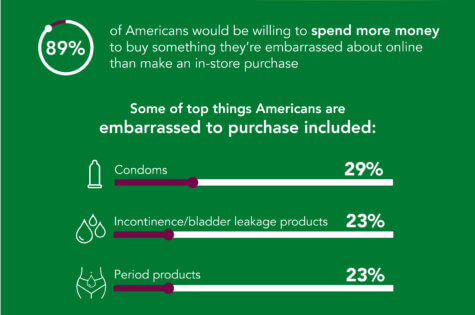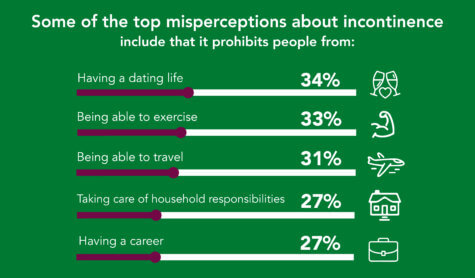NEW YORK — Do you find yourself checking to make sure the aisles are empty when buying certain health items at the pharmacy? According to a new survey, Americans are willing to pay extra for personal hygiene products online, just to avoid the embarrassment of buying in a store.
The survey polled 2,000 Americans and discovered that 89 percent would opt to spend more money to purchase items online that they would otherwise feel embarrassed about buying in person. Just over half (51%) say the items they purchase in-store that embarrass them include period cups, laxatives, or incontinence products such as adult underwear.
Shopping cart anxiety
 More than half the poll (56%) say they’ve avoided purchasing personal care products out of fear of being judged. Three in four say they worry so much the cashier will judge them that they’ll grab random items to throw them off.
More than half the poll (56%) say they’ve avoided purchasing personal care products out of fear of being judged. Three in four say they worry so much the cashier will judge them that they’ll grab random items to throw them off.
Conducted by OnePoll on behalf of Depend, the survey also reveals 72 percent of people worry that other shoppers or store employees will judge their purchases. Meanwhile, 67 percent admit that they’re also judgmental of other shoppers.
The results further showed many people don’t feel confident in these “embarrassing” purchases until their late twenties (19%) or their mid-thirties (18%). Seven in 10 believe conversations about taboo topics are more widely acceptable now than they ever have been before. Meanwhile, just as many believe there should be more open dialogue around topics like health and aging.
Nearly half of respondents (49%) say they used to feel incontinence products were gross and a sign of being unhealthy, but 71 percent who made that admission now understand that using these products is nothing to be ashamed of.
Coming to terms with incontinence
Forty-five percent add having their first child led them to acceptance and 46 percent believe having an honest conversation with their doctor was an eye-opener. Other reasons that changed people’s minds include opening up to their friends and family about it (54%) and knowing a loved one who uses incontinence products (51%). Although 31 percent of participants have never experienced incontinence, one in three know someone who has.
“Facing stigmas is something we’re all working to overcome, but we’re encouraged by the data that suggests Americans are open to increased conversation around taboo topics, like incontinence,” says Lauren Kren, Senior Brand Manager for Depend brand, in a statement.
 Incontinence (71%) and colorectal health (61%) are among the top five health problems people still consider taboo. Respondents also consider topics like mental health (65%), menstruation (64%), and skin care (58%) to be topics they’d rather avoid.
Incontinence (71%) and colorectal health (61%) are among the top five health problems people still consider taboo. Respondents also consider topics like mental health (65%), menstruation (64%), and skin care (58%) to be topics they’d rather avoid.
The survey also reveals a little over one-third (36%) feel comfortable talking about incontinence with friends and family. This could be because 58 percent of respondents — and nearly nine in 10 (87%) of those who actually experience incontinence — think there’s a stigma associated with the condition where people assume you’re unhealthy. Other misperceptions on incontinence include people thinking they will not being able to participate in dating and intimacy (34%), exercise (33%), travel (31%), or have a successful career (27%).
Still, two in three people say they would pick up incontinence products for a friend or family member if needed. A small number of people admit they wouldn’t because they’d feel ashamed or embarrassed.
“Incontinence impacts more than 65 million Americans, and the sooner we let go of misperceptions around this issue, we can better support and allow people to live worry-free,” Kren adds.
